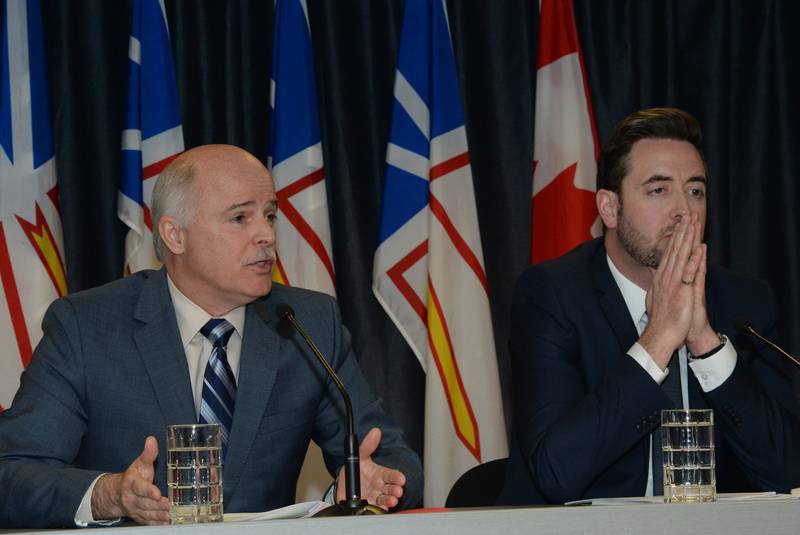You are here
Home 🌿 Recreational Marijuana News 🌿 Newfoundland and Labrador capable of drugged-driving enforcement: police, MADD 🌿Newfoundland and Labrador capable of drugged-driving enforcement: police, MADD

New penalties under provincial Highway Traffic Act coming ahead of legal cannabis.
A significant aspect of dealing with legalized cannabis for recreational use is tied to policing and enforcement.
There is already a ban on drug-impaired driving under the Criminal Code of Canada, as RNC Const. Karen Didham noted while speaking with reporters about cannabis Monday at the Confederation Building.
Didham is a certified drug recognition evaluator — a key part of investigating those cases where there is possible driving under the influence of drugs.
“I’ve been testing specifically for drug-impaired driving for the last 12 years,” she said, explaining it begins when police have reason to believe a driver might have been exposed to drugs.
Roadside, police can conduct a standard field sobriety test. That test can elevate the suspicion to probable grounds to say a person could be impaired. A new saliva swab, able to detect cannabis use (though not the level of exposure), is in the works for roadside as well. It still has to be approved and procured by the federal government.
From that point roadside, police conduct a 12-step drug recognition evaluation (DRE) at the nearest detachment or designated testing location. The steps include an interview, to determine if a medical condition might be involved, but also to check for physical indicators, including tests of pupil reactions and co-ordination. The tests end not only with an opinion on impairment, but with the police officer suggesting what class of drug might be involved in the case.
“After we have formulated the grounds to believe they are in fact impaired by a drug, we would make a demand for urine or blood,” Didham said.
- test of bodily fluid could determine the THC levels involved in the case of cannabis and marijuana use — a significant step, given federal law demands stiffer penalties in cases of higher THC levels, or for mixtures of THC and alcohol.
These fluid sample tests have to go through the RCMP crime lab and can take months to return results, but in cases reaching even the level of a failed field sobriety test or DRE, the province’s Highway Traffic Act will allow a driver’s vehicle to be immediately impounded for seven days.
A refusal to submit to testing will result in a 30-day vehicle impoundment, mirroring the approach to alcohol.
When laboratory results come back (months after the fact, with future estimates varied), there will be a 90-day provincial suspension from driving, under proposed Highway Traffic Act amendments, atop existing Criminal Code penalties.
MADD Canada president Patricia Hynes-Coates said she’s pleased with what’s set out for the province and doesn’t question the ability for police to determine if someone is impaired.
“The DREs have been doing a phenomenal job for the last X number of years here in our province and I think once they’re provided with a tool such as the saliva test, which will be passed, hopefully, shortly through (federal) Bill C-46, we are hoping that that’ll just provide a guarantee they are going to be able to get the people who are impaired off the roads,” she said, also speaking to reporters, after the new provisions under the Highway Traffic Act were revealed by Justice Minister Andrew Parsons.
Hynes-Coates said alcohol-related deaths resulting from drunk driving are on the decline in Canada, but drugs are another issue altogether.
“We tell you if you’ve smoked something, don’t drive for at least four hours. We would like to see you have zero tolerance,” she said, noting existing ad campaigns against driving after being exposed to drugs.
“We don’t want to see you get out on the roadway and injure or kill somebody. And from someone who’s buried a loved one, please don’t do that.”
420 Intel is Your Source for Marijuana News
420 Intel Canada is your leading news source for the Canadian cannabis industry. Get the latest updates on Canadian cannabis stocks and developments on how Canada continues to be a major player in the worldwide recreational and medical cannabis industry.
420 Intel Canada is the Canadian Industry news outlet that will keep you updated on how these Canadian developments in recreational and medical marijuana will impact the country and the world. Our commitment is to bring you the most important cannabis news stories from across Canada every day of the week.
Marijuana industry news is a constant endeavor with new developments each day. For marijuana news across the True North, 420 Intel Canada promises to bring you quality, Canadian, cannabis industry news.
You can get 420 Intel news delivered directly to your inbox by signing up for our daily marijuana news, ensuring you’re always kept up to date on the ever-changing cannabis industry. To stay even better informed about marijuana legalization news follow us on Twitter, Facebook and LinkedIn.




